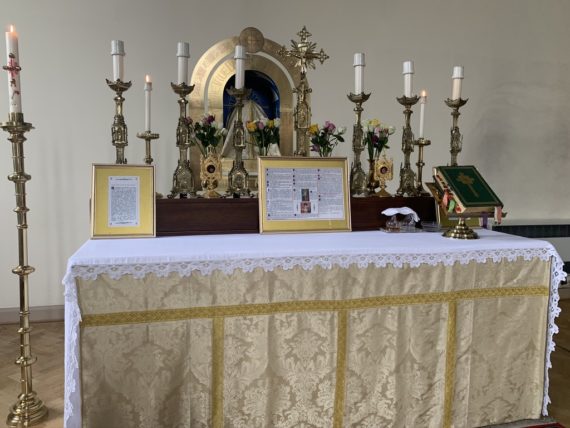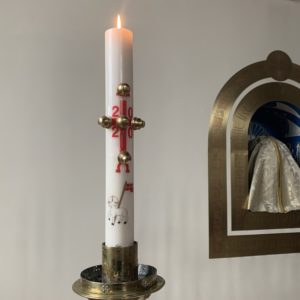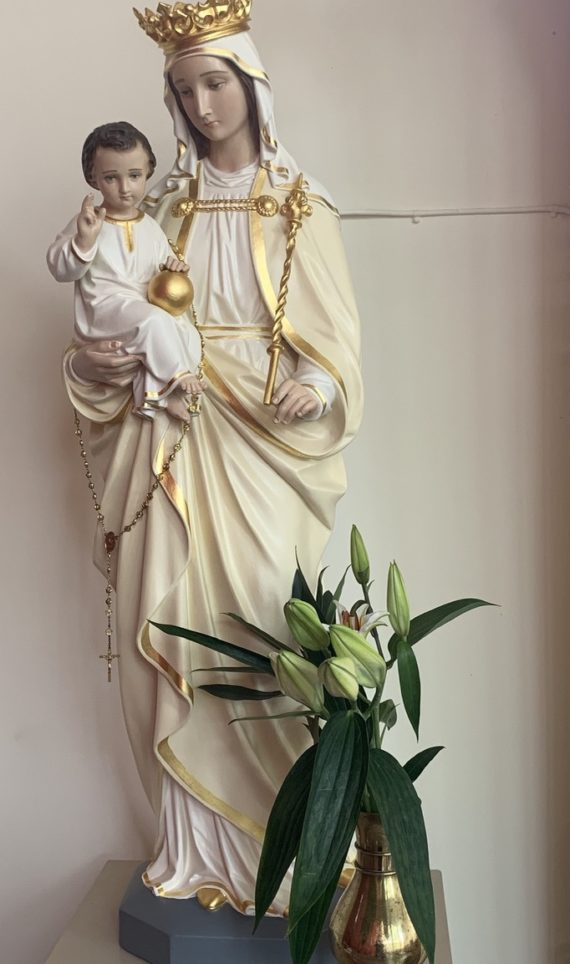Easter in lockdown – a Sermon

A monk of my acquaintance once drily remarked, as he looked across at the banks of gloomy faces in the choir stalls opposite, that he sometimes doubted the Resurrection had really happened.
The point is well made. It can be easier in a way, for us Catholics, to identify with Lent and Passiontide than with Easter. Even if we haven’t kept our Lenten resolutions as well as we would have liked, we still relate more readily to the themes of penance and punishment, sacrifice, suffering, and death, than we do to joy and peace and new life.
And there is good reason for this. Suffering and anguish is ever present in our world – no one is spared it, to one degree or another, just as all will certainly undergo the sentence of death. But joy, when it comes, tends to be more fleeting, rapidly overshadowed by some difficulty. There is a risk that Easter, for us, becomes little more than a natural consolation, a merely temporary respite from gloom, when we are allowed to break the fast, put out flowers, and eat chocolate – with little sense of something life-transforming.
Perhaps this seems all the more the case now of all times, when the present pandemic continues to overwhelm just about the whole globe; and does not appear to be ceasing for the commemoration of Our Lord’s Resurrection. Indeed, we are denied even the consolation of celebrating Easter by attending the sacred rites.

And yet Our Lord has truly risen – and we must, we must, allow this glorious truth somehow to penetrate our lives.
There can be little doubt that the coronavirus pandemic is a divine chastisement. This really ought to be an uncontroversial statement, but it seems there is no shortage of people, even senior churchmen, to deny it. No doubt this ultimately springs from a loss of the sense of the supernatural, the recognition that God is the cause of all things whatsoever; but perhaps in part it is motivated by a false understanding of God’s love and mercy (“a loving God would never do that…”). And perhaps even more there is the anxiety that if we say God is punishing for sin, then we must ask, ‘which sin?’; and then it amounts to saying that those who die from the virus are the most guilty of that sin, that they apparently ‘deserved it’.
But that’s not really the case. Firstly, to us Catholics, it should come as no surprise if chastisement is visited upon a whole people collectively, or if the innocent are asked to suffer on behalf of the guilty. After all, both these aspects are precisely the themes of Holy Week. Your clergy have been reciting, in the Divine Office, the prophecies of Jeremiah, warning of the wrath upon Israel, the exile into Babylon, and the destruction of the temple – culminating in his haunting lamentations that are sung in the Office of Tenebrae during the Triduum. And then on Good Friday, we looked at Our Saviour upon the cross, He who was without sin accepting the terrible price for the redemption of sinners.
As to which sin God is chastising us for – well, there will always be the temptation to name our ‘favourite’, whichever of the innumerable manifold vices and perversions of fallen human nature pique our interest. There is more than enough to choose from in the secular society: abortion, euthanasia, same-sex “marriage”, gender ideology, human trafficking… the list goes on and on. Or there is the spread of false religions or militant atheistic ideologies. And then within the Church we can make another catalogue: clerical sexual abuse, rampant heresy, disobedience, and schism, disregard of Sundays and holy days, liturgical abuses, widespread impurity, indifference and faithlessness, sacrilegious Communions, badly made confessions (if made at all), and so on. It seems foolish to try and identify just one that is the cause of all our ills. But all of these things eventually boil down to one – the rejection of and failure to worship the One True God. And for this, our collective punishment is long overdue.
And in reality, all of these faults put together pale into insignificance next to but a single act of sacrilege or idolatry. We do not tend to feel it is so – but God’s view is not our view. God tends to punish precisely by abandoning the people to what they have craved. So in a world that elevates individualism over communal responsibility, perhaps it is fitting that there should be enforced ‘social distancing’; and if, as I suggest, everything is ultimately about our failure to give God right worship, then we should not be surprised if we Catholics have to bear our brunt of the chastisement in our very particular way – the cessation of public Masses (and even, in some places – horribile dictu – of all the sacraments).
In fact, in a sense, this is the worst of the curses. To say this may seem to be incredibly cold and indifferent given the very real pain, suffering, and loss that many are going through at this time because of the virus, not to mention the horrific economic fallout. I do not mean in any way to diminish this. But we should recognise that man’s purpose and fulfilment lies precisely in the worship of God. We are more than the body only, and there is more than this life only.
This is felt all the more keenly precisely by those who are the most devout, who we would think least ‘deserve’ it, since they want to offer God fitting worship and are struck by its loss the most acutely. But it was ever thus. The prophets warned Jerusalem of what was coming and wept for it, while the hierarchy repeated complacent, empty mantras: “peace, peace, but there is no peace” (Jer. 6:14; cf Ez. 13:10), or “we have the temple” – then even this consolation was taken away from them (Jer. 7:4).
Israel had gone after false gods; and then the True God withdrew from them.
Probably this Easter many will feel much like Psalm 136: “by the waters of Babylon, there we sat and wept when we remembered Sion…how shall we sing the song of the Lord in a strange land?”
And yet, the Babylonian exile was not forever. Israel was restored – at least in part – and the temple was rebuilt. And all this was for a sign of the death and Resurrection of Our Blessed Lord. Ecce, omnia nova facio (Rev. 21:5). Death is not the final word; Christ has claimed victory, and it is decisive.
Thus there can be joy, even in the midst of distress and bewilderment. It is not a transient sentiment, but a deep conviction that stems from faith of the love that God has for us, a love proved dramatically on Calvary. This joy does not simply happen on its own: it can and must be cultivated, through acts of faith and above all charity.
This present moment too shall pass. But will our lessons have been learned? Divine chastisement is never a matter of an angry God fulfilling a lust for vengeance. It is a correction; and as a correction, it is a loving act of mercy, a means by which God draws us back to Him. For our part, we should not be longing for things to ‘return to normal’, but rather seeing where we need a true conversion of heart.
Is this not the message of St Paul? “For if we have been planted together in the likeness of his death, we shall be also in the likeness of his resurrection. Knowing this, that our old man is crucified with him, that the body of sin may be destroyed, to the end that we may serve sin no longer” (Rom. 6:5-6); and: “Therefore if you be risen with Christ, seek the things that are above, where Christ is sitting at the right hand of God. Mind the things that are above, not the things that are upon the earth. For you are dead: and your life is hid with Christ in God. When Christ shall appear, who is your life, then you also shall appear with him in glory” (Col.3:1-3).
May we never again take the Holy Mass for granted! May we come to treasure anew the beautiful gift of the Sacraments. Let us prepare well to make good, humble confessions, and approach the Holy Eucharist with awe. Let us resolve above all to pray always, with thanks in our hearts, and to take every opportunity to give to Almighty God the adoration that is owed to Him.
And if we do this, the mystery of Easter will have truly penetrated our lives, and the joy of the Risen Christ will be in us – and no one can take this away.
May God bless you, and Our Lady keep you.
